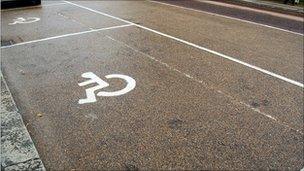Disabled people and carers face '£9bn welfare cut'
- Published

More than 2.5m people receive incapacity benefit or employment support allowance
Disabled people will be hit with more than £9bn in welfare cuts over the next five years, a think tank has warned.
Demos suggests the government's plans will see 3.6m disabled people and carers lose about £9.2bn by 2015.
It said moving those on incapacity benefit who were reassessed as fit to work to jobseeker's allowance would account for half of the losses.
The government said people who were too sick or disabled to work would continue to receive the support they needed.
More than 2.5m people are on incapacity benefit or its successor, employment support allowance, costing about £12.5bn a year.
Although the extent of the welfare cuts will be announced in the comprehensive spending review later this month, the government has already said it will reassess all claimants of incapacity benefit for their "readiness to work".
Pilots are due to start in Burnley and Aberdeen next week, with a national roll-out scheduled for early next year.
Those deemed fit enough to work will be moved on to jobseeker's allowance (JSA) instead.
Demos calculated the impact of moving 500,000 people from incapacity benefit to JSA would amount to a loss of £4.87bn.
It says this will mean less money for the individual and less one-on-one support to help them find work.
It argues the move will result in more disabled people being trapped in long-term unemployment and this will ultimately cost the taxpayer far more than at present.
Inflation measure
Minister for Employment Chris Grayling said the new Work Programme would ensure everyone who could work would get the help and support they needed.
"We know that many of the people trapped on incapacity benefits could and do want to work, but the current system doesn't allow them to," he said.
"That's why we'll be reassessing everyone claiming incapacity benefits, starting in Burnley and Aberdeen on Monday and the rest of the country from spring next year.
"Those found too sick or disabled to work won't be expected to, and will continue to receive the help and support they need."
The Demos report also points to the government's decision to link benefits, except the state pension, to the lower consumer prices measure of inflation.
It says this will mean less money for a range of benefits, including carers' allowance and disability living allowance.
The report, called Destination Unknown, warns that by 2015, families with disabled children will lose more than £3,000 each and disabled adults whose partner is a full-time carer will also lose about £3,000.
In a series of recommendations, Demos calls on the government to allow disabled people to take a lump sum of housing benefit to enable them to buy their own home, giving them more financial control.
The report also says ministers should reform the work capability assessment, introduced by Labour in 2008, to assess psychological, social and practical barriers to employment, rather than just medical difficulties.
'Social exclusion'
Former Labour minister Kitty Ussher, director of Demos, said the government's welfare reforms threatened to "exclude people further".
Richard Hawkes, chief executive of disability charity Scope, said the figures were "alarming".
"With such dramatic losses on the horizon, how will the government be able to 'protect' the people who need support the most?" he said.
"Without them, hundreds of thousands of disabled people will be forced into a cycle of long-term unemployment, poverty and social exclusion. That is not only bad for disabled people but also bad for the public purse.
"Disabled people must not be pushed even further backwards in our society by the pursuit of deficit reduction."
- Published9 October 2010
- Published2 October 2010
- Published28 June 2010
- Published14 September 2010